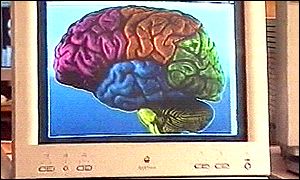|

Brain scanning has revealed how years of music practice have changed the brains of professional musicians. Research announced to the American Academy of Neurology annual meeting in Philadelphia, US, has shown how musicians have more "grey matter" - or brain cells, in certain key regions. While it is not certain that these differences developed as a result of their musicianship rather than the other way around, it is a strong possibility that the musicians have reshaped their minds over the years.
Professor Gottfried Schlaug, a German expert, looked at 15 professional male musicians, and 15 non-musicians. He used a magnetic resonance imaging (MRI) scanner to chart the various regions of their brains. The findings were clear-cut: the musicians had more grey matter in at least four regions of the brain. These are regions that are sometimes associated with skills useful to musicians - for example, the ability to co-ordinate movements in response to visual cues, or process auditory cues.
Reshaping the brain
Professor Schlaug said: "Additional study is necessary to confirm causal relationships between intense motor training for a long period of time and structural changes in motor and non-motor related brain regions. "An alternative explanation may be that these musicians were born with these differences, which may draw them towards their musical gifts."
There have been other findings which suggest that the brain can be reshaped in response to repetitive tasks. Taxi drivers given brain scans by scientists at University College London, UK, had a larger hippocampus compared with other people. This is a part of the brain associated with navigation in birds and animals. The scientists also found part of the hippocampus grew larger as the taxi drivers spent more time in the job.
Dr Eleanor Maguire, who led that research team, told that it would be difficult to prove that the brain changes were due to musical practice. She said: "In the last two years, there has been a fair bit of research in rats and primates looking at neurogenesis - where the new neurons are produced - and that has found that the hippocampus in particular has something to do with learning. Whether these changes can take place in the other areas of the cortex, which this study talks about, is just not known at the moment."
|